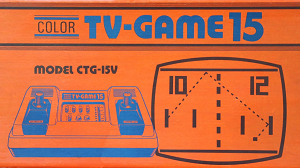| Site Notice |
|---|
|
Difference between revisions of "Color TV-Game"
Torchickens (talk | contribs) |
(Rewrote some of the introduction and added a section for the Color TV-Game 6 #cww) |
||
| Line 1: | Line 1: | ||
[[File:Color TV Game 15.png|thumb|right|300px|Color TV-Game 15 boxart]] | [[File:Color TV Game 15.png|thumb|right|300px|Color TV-Game 15 boxart]] | ||
| − | '''Color TV-Game''' (カラーテレビゲーム) | + | '''Color TV-Game''' (カラーテレビゲーム) is a series of five consoles made by Nintendo between 1977 <ref name="ch6">https://www.computinghistory.org.uk/det/20732/Color-TV-Game-6/</ref> and 1980 <ref>http://blog.beforemario.com/2011/02/computer-tv-game-tv-1980.html</ref>. They are Nintendo's first gaming consoles. |
| + | |||
| + | The consoles include the ''[[Color TV-Game 6]]'', ''[[Color TV Game-15]]'', both of which are based on Pong, ''[[Color TV Game Racing 112]]'', a racing game, ''[[Color TV Game Block Kuzushi]]'', based off Nintendo's arcade game ''[[Block Fever]]'', and ''[[Computer TV-Game]]'', which is based on ''[[Computer Othello]]'', another early arcade game made by Nintendo. | ||
| + | |||
| + | ==''Color TV-Game 6''== | ||
| + | The ''Color TV-Game 6'' was the first console in the Color TV-Game series, released in 1977. It features a game called Light Tennis, which is similar to Pong <ref name="ch6"/>. There are 3 variants of the game: hockey, volley ball and tennis. Each of these can be played as singles and as doubles. <ref name="bm6">http://blog.beforemario.com/2011/04/nintendo-color-tv-game-6-6-1977.html</ref>, which gives the console 6 different games. Singles has only one racket, and doubles has two. The switches on top of the console allow the player to set the size of the racket, the acceleration of the ball, whether to play singles or doubles, and the game variant.<ref name="bm6"/> | ||
| + | |||
| + | There are two variants of the ''Color TV-Game 6'', the CTG-6S, which was released initially, and the CTG-6V which was released later.<ref name="bm6"/>. The CTG-6S did not stop the player's racket at the edge of the screen. The CTG-6V prevented this from happening, which made the game easier to play.<ref name="bm6"/>. The consoles were also different colors. The CTG-6S was white, and the CTG-6V was orange. The controllers are also a little bit different.<ref name="bm6"/> | ||
| − | |||
[[Category:Color TV-Games|*]] | [[Category:Color TV-Games|*]] | ||
{{stub}} | {{stub}} | ||
Revision as of 03:20, 23 September 2023
Color TV-Game (カラーテレビゲーム) is a series of five consoles made by Nintendo between 1977 [1] and 1980 [2]. They are Nintendo's first gaming consoles.
The consoles include the Color TV-Game 6, Color TV Game-15, both of which are based on Pong, Color TV Game Racing 112, a racing game, Color TV Game Block Kuzushi, based off Nintendo's arcade game Block Fever, and Computer TV-Game, which is based on Computer Othello, another early arcade game made by Nintendo.
Color TV-Game 6
The Color TV-Game 6 was the first console in the Color TV-Game series, released in 1977. It features a game called Light Tennis, which is similar to Pong [1]. There are 3 variants of the game: hockey, volley ball and tennis. Each of these can be played as singles and as doubles. [3], which gives the console 6 different games. Singles has only one racket, and doubles has two. The switches on top of the console allow the player to set the size of the racket, the acceleration of the ball, whether to play singles or doubles, and the game variant.[3]
There are two variants of the Color TV-Game 6, the CTG-6S, which was released initially, and the CTG-6V which was released later.[3]. The CTG-6S did not stop the player's racket at the edge of the screen. The CTG-6V prevented this from happening, which made the game easier to play.[3]. The consoles were also different colors. The CTG-6S was white, and the CTG-6V was orange. The controllers are also a little bit different.[3]
| This article is a stub. You can help NintendoWiki by expanding it. |
